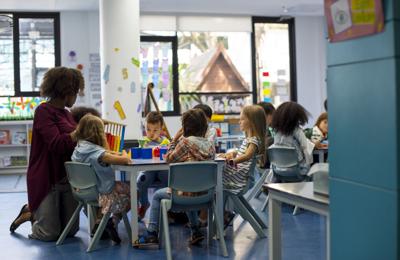After roughly 100 days spent learning from home over the COVID-19 pandemic, it appears some Ontario students have “forgotten how to be in school,” researchers say.
A new study out of Brock University found Ontario teachers and students alike reported a significant rise in classroom “incivility” in the years following the 2020 lockdowns, from talking during class to packing up and leaving before the lesson is over.
“We found that, overwhelmingly, the teachers were saying their students are more uncivil,” Natalie Spadafora, a post doctoral fellow and adjunct professor in the department of child and youth studies at Brock University and the study’s lead author, told the Star. “They don’t know the same school routines that they would have in those years of interrupted learning.”
Data from four of Ontario’s largest school boards reveals reasons for kids to be scared. Teachers say problems are even worse than they appear.
Data from four of Ontario’s largest school boards reveals reasons for kids to be scared. Teachers say problems are even worse than they appear.
These “low-level antisocial behaviours” could then lead to bullying and hamper kids’ social and academic development, she continued. “If left unchecked, they could build up and escalate to more anti-social behaviour.”
Her team’s paper was recently . Here’s what it says about the state of education in Ontario.
Classroom rudeness on the rise
Spadafora’s study queried 308 students aged nine to 14 across six schools in southern Ontario both before and after the pandemic, as well as 101 educators teaching grades 1 through 3 in 2022.
The results were stark. Of the primary school teachers, 42 per cent reported daily instances of classroom incivility, compared to just six per cent before the pandemic. Sixty-eight per cent rated this behaviour as “moderately” or “very” serious in the 2021-2022 school year — more than double the 32 per cent reported prior to the school shutdowns.
Meanwhile, nearly 94 per cent of the teachers said their current class had overall skills and academic skills either “lower” or “much lower” than their previous cohorts. Similarly, 95 per cent said their class had “lower” or “much lower” socioemotional skills than prior students.
“Students are selfish, have zero concern for others, expect everything to be done for them, do not problem solve at all,” one Ontario teacher said in their response for the study. “They do what they want when they want.”
Another educator added that “students don’t listen to their teachers, they feed off each other’s energy leading to a downward spiral of chaos.”
I am a Jewish high school student in pc28¹ÙÍøand the founder of an anti-bullying initiative. Unfortunately, it isn’t small acts of kindness I see
I am a Jewish high school student in pc28¹ÙÍøand the founder of an anti-bullying initiative. Unfortunately, it isn’t small acts of kindness I see
For their part, queried students also self-reported greater levels of incivility in the fall of 2022 compared to the same time in 2019. Despite this, other variables including bullying and friendship remained relatively unchanged.
“That’s not to say that those things weren’t impacted and didn’t change,” Spadafora said, explaining that bullying could have gone during the pandemic only to pick up after students returned to the classroom. “But we don’t have that data, so we don’t actually know.”
Why is this happening?
Spadafora says it all comes down to a “lack of practice.”
“During primary grades, you spend a lot of time learning how to be in school,” she explained. “You raise your hand, you don’t talk when the teacher’s talking, you take turns speaking... These kids didn’t get that when they were at home.”
It’s why, while the researchers couldn’t directly compare between grades, Spadafora’s team believes younger students were hit especially hard by the pandemic, as they missed out on the formative teachings on how to behave in a classroom setting.
Older students were at least taught the basics, she said; while they may have forgotten some of it over the pandemic, “it was probably easier to come back from than starting at ground zero.”
For their part, teachers felt students’ lack of routine or schedule over the pandemic contributed to in-class rudeness. Specifically, students grew used to online learning and had difficulty adjusting back to the classroom.
A program at the pc28¹ÙÍøCatholic District School Board builds reading and math skills for students who have just completed Grade 1.
A program at the pc28¹ÙÍøCatholic District School Board builds reading and math skills for students who have just completed Grade 1.
“They didn’t have to be aware of others around them because they could just mute themselves while the class was happening and/or turn off the camera,” one primary school teacher wrote. “There was no need for self-regulation online.”
Adding to this was a lack of socialization and exposure to others — students were still working to develop social skills “they didn’t have time to concretely solidify during this time,” another teacher said.
Now that we have evidence this is happening, Spadafora said it’s imperative to nip the issue in the bud.
“The bottom line is, since we know it could escalate into higher level anti-social behaviour, it elevates the importance of intervening while (the issue is still manageable),” she said. “We want civil kids to become civil adolescents, to become civil adults.”






























To join the conversation set a first and last name in your user profile.
Sign in or register for free to join the Conversation